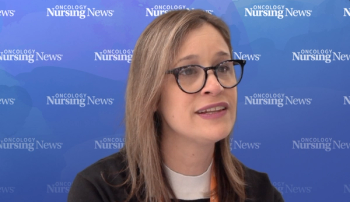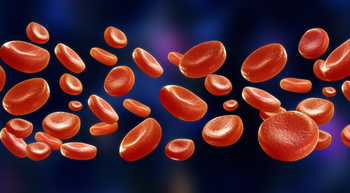
In this episode of The Vitals, we speak with an expert who discussed the importance of supportive care and education for patients with lung cancer who are treated with immunotherapy.

In this episode of The Vitals, we speak with an expert who discussed the importance of supportive care and education for patients with lung cancer who are treated with immunotherapy.

The role of a verification nurse can lead to several benefits, including the prevention of errors from reaching the patient, decreased workload, and potential cost savings from less drug waste.

Throughout April, the FDA approved drugs for the treatment of diseases including solid tumors, lung cancer, multiple myeloma, bladder cancer, and low-grade glioma.

The newly appointed president of the Oncology Nursing Society (ONS) discussed healthcare policies that she and ONS will continue to advocate for in the cancer space.

Trastuzumab deruxtecan enhanced survival without disease progression compared with chemotherapy in HR-positive, HER2-low metastatic breast cancer after 1 or more lines of endocrine therapy.

The FDA has approved tisotumab vedotin-tftv for the treatment of patients with recurrent or metastatic cervical cancer with disease progression on or after chemotherapy.

From journaling to delegating everyday tasks, nurses can teach patients how to cope with treatment-related fatigue.

Trastuzumab-strf was approved for HER2-overexpressing breast cancer and HER2-overexpressing metastatic gastric or GEJ adenocarcinoma.

Poor sleep quality among those with lung cancer and COPD emphasize the need to develop effective assessment strategies.

Nurse coordinators should aim to transmit information to both the patient and caregiver during outpatient CAR T-cell treatment process.

A pilot study proved that a nurse-coordinated approach shows promise in treating more than just 1 symptom among patients with cancer.

Advanced practice providers can lead clinical teams and patients to boost oncology clinical trial enrollment, a nurse practitioner explained.

A subgroup of patients from the 3 CARTITUDE trials experienced cranial nerve palsy after treatment, most of whom were men.

As symptom severity can vary by patient, it is key for nurses to increase assessment for early intervention of patients with head and neck cancer following treatment, according to Meredith Cummings, PhD(c), BSN, RN, OCN.

Establishing a nurse-led system to administer tocilizumab in patients receiving bispecific antibodies tended to get the immunosuppressive drug to patients faster.

A feasibility study on the use of a mobile application for patients after undergoing a stem cell transplant may help care teams quickly identify and treat graft-versus-host disease.

Patients who were given telehealth, vs in-person, exercise programs to manage their symptoms from cancer care experienced similar outcomes, highlighting an alternative for providers to consider.

Results from the CARTITUDE-2 trial support cilta-cel in patients with multiple myeloma, which addresses the unmet needs of these patients, an expert presented.

An oncology nurse details strategies used at his institution to reduce burnout — which can ultimately decrease the rate of “silent quitting.”

Encouraging responses were observed in most patients with relapsed/refractory follicular lymphoma treated with loncastuximab tesirine and rituximab.

Patients in the CARTITUDE-4 trial experienced a high response rate to the treatment as early as their first relapse.

The establishment of a multidisciplinary committee can help identify opportunities to best face the ongoing cancer drug shortage.

Tools to educate oncology nurses and patients on the use of Mepitel film to prevent radiation dermatitis has improved the workflow around its introduction to patients with breast cancer, as well as its application and maintenance.

Older patients with cancer demonstrated a moderate to high symptom burden, leading to the need for routine symptom assessments and tailored management interventions.

Over 500 attendees at this in-person event celebrated the incredible efforts made by oncology nurses when caring for patients with cancer.

Oncology nurses can educate their patients on the latest developments in CAR T-cell therapy for the treatment of glioblastoma.

An expert discussed a screening tool that she and her colleagues used to connect patients with cancer to palliative care services in a more effective way.

The FDA approved tovorafenib for certain patients with relapsed or refractory pediatric low-grade glioma.

Lutetium Lu 177 dotatate was approved by the FDA for children aged 12 years and older with somatostatin receptor-positive gastroenteropancreatic neuroendocrine tumors.

Patients with BRCA wild-type triple-negative breast cancer treated with olaparib on a gap schedule with chemotherapy did not experience improved responses compared with chemotherapy alone in the neoadjuvant setting.